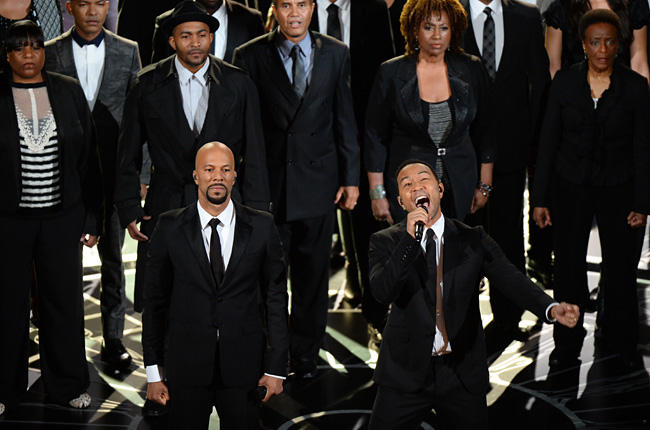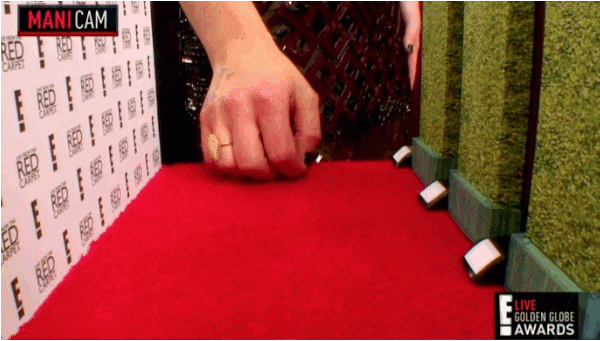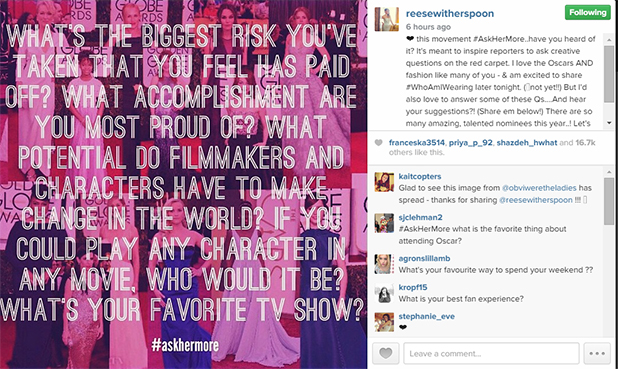
One, Pharrell and Beyoncé channeling #BlackLivesMatter at the Grammys a couple weeks ago. Two, the lack of People of Color nominated for acting roles. Three, the Twitter trends #OscarsSoWhite and #AskHerMore.
21 million people watched Hollywood’s biggest awards show Sunday night, making it a perfect platform to step onto a soap box in the hopes of being heard around the world. In a world full of political demonstration and YikYak rage, the directed action of a high-profile person saying high-profile things has a big impact. There were moments at the Oscars that moved beyond the mani cam and the opening number: the golden statue became a megaphone. Below are my top five moments of Oscars politics:
1. “Glory,” The Bridge, and The Acceptance Speech
The video above shows John Legend and Common accepting their Oscar for Best Original Song, “Glory” from the movie Selma. Their performance of the song, earlier in the night, featured Legend on a grand piano, Common making a dramatic entrance through a large Edmund Pettis Bridge set, several dozen solemn marchers, and a gospel choir. It left goosebumps prickling my spine. In light of Ferguson, Eric Garner and the #Stanford68, this struck a powerful nerve. Honestly, they do a better job explaining its significance than I can so I’ll just say, there’s a reason so many in the audience were crying.
2. Patricia Arquette’s fatal case of White Feminist Foot-In-Mouth disease

Patricia Arquette’s acceptance speech for Best Supporting Actress in “Boyhood” had so much potential. I heard the words “wage equality” and was swept up in the enthusiastic responses of Meryl Streep and JLo. I even uttered a “YYYYAAAAASSSSS” before realizing her statement was deeply problematic. After thanking everyone who put her in dress and helped her memorize her lines, she shoved her own foot down her esophagus, saying “To every woman who gave birth… We have fought for everybody else’s equal rights. It’s our time to have wage equality once and for all and equal rights for women in the United States of America… It’s time for all the women in America, and the men who love women and all the gay people and people of color we’ve all fought for to fight for us now”.”
First of all, not all women have the capability to give birth, don’t leave transgender women and others without reproductive capacity behind.
Secondly, your color determines your wage gap. White women earn 77 cents to the dollar, Black women earn 68 cents to the dollar, and Hispanic women earn 55 cents to the dollar.
Thirdly, as far as I know, the fight for equal rights is still going on. Did Black and Brown people stop marching in Ferguson during the red carpet event? Was immigration policy tackled during Neil Patrick-Harris’ opening number? Were Queer people’s rights to have housing cemented during “Everything Is Awesome”? If so, great! But I don’t think that’s what went down.
So close and yet so far.
3. Sean Penn’s Green Card comment
Alejandro Iñnaritu won the Oscar for Best Director, Best Original Screenplay, and Best Picture, three of the highest honors of the night. And for Sean Penn to stand up there with his nasty little mustache and say “Who gave this sonofabitch a Green Card?” before announcing Birdman as Best Picture was irrevocably inappropriate. It was apparently an inside joke (they worked on 21 Grams together), but I don’t think that excuses Penn’s poor behavior at all. Don’t pull the “I have Mexican friends” card. And if you are such good friends, why are you killing the biggest-moment-of-his-professional-career vibe? You’re shoving his face in the birthday cake.
During his Best Picture acceptance speech, Iñnaritu dedicated his award to his “fellow Mexicans,” both the ones back in Mexico and the ones who are part of the “latest immigrant population in this country… that they can be treated with the same dignity and respect of those who came before and built this great immigrant nation.” He says this in front of a room full of British and Australian people living and working in LA. Who made a joke about their Green Card? Where was the sass then? Oh wait, there was none. People seem to forget that the entire country is built on immigration. If Penn was so worried about immigration, he would have asked the Aussies for their papers.
4. Breaking the silence on suicide
Three speeches — from the winners of Best Adapted Screenplay for The Imitation Game, Best Documentary Short for Crisis Hotline: Veterans Press 1, and Best Live Action Short for The Phone Call — referenced the importance of talking about mental health. In Graham Moore’s (writer for The Imitation Game) speech, he referenced “being weird” as a cause of adolescent strife. “When I was 16 years old, I tried to kill myself because I felt weird and I felt different and I felt like I did not belong,” Moore said. “And now, I’m standing here and I would like for this moment to be for that kid out there who feels like she’s weird or she’s different or she doesn’t fit in anywhere: Yes, you do. I promise you do. You do. Stay weird, stay different.” Many thought that the “weird” Moore was referring to was a nod to his sexuality (which made sense in the light of Alan Turing), but he later confirmed it was not.
In the affected circus of Hollywood, using film to examine the realities of mental illnesses is vital to its destigmatization. Suicide is an epidemic and needs to be discussed. In light of the very public death of Robin Williams this past year, the Oscars became an ideal place to address the issue. Films this year explored mental health in a vitally and hard to come by truthful light, and I urge you to watch the two winning shorts as well as Two Days, One Night (featuring an Oscar nominated Marion Cotillard).
5. #AskHerMore, or How Well Can Naomi Watts Make a Frittata?
Have y’all heard of the Mani Cam? It’s the red-velvet lined shoebox actresses are asked to stick their painted paws in to show off their fingernails as opposed to talking about their craft (because as we all know a glittery topcoat is more important than talent). This inane practice is accompanied by the Stilletto Cam and the Clutch Cam. Elizabeth Moss famously led the charge against this form of superficial misogyny by flipping off the Mani Cam at the 2014 Golden Globes.

At Sunday night’s Oscars, Ryan Seacrest asked the enormously brilliant Naomi Watts about her choice of frittata fillings, putting her egg pie skills above her performance in Birdman. Go boil your head Mr. Seacrest, what do you anyways?
Reese Witherspoon took to the Twittersphere on Sunday afternoon to urge journalists to #AskHerMore.

I deeply hope this is the start of something new, the dawn of red carpet conversations that extend past an actress’ outfit choices and delve deeper into their work. It’s important interviewers take the time to see these actresses as more than a pair of tits wrapped in expensive fabric. Please, feminists of the Twittersphere and beyond, don’t let this die.
***
Benina Stern contributed to this story.
